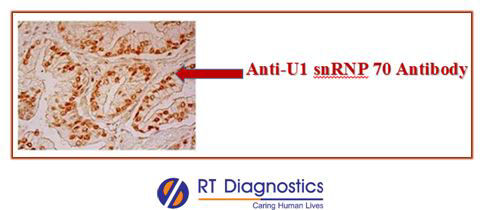Antibody Ui-Sn-Rnp
Anti U1-RNP (Ribonucleoprotein) antibodies are produced by the abnormal immune system which is associated with mixed connective tissue disorders (MCTD). This test is used to measure anti-U1-snRNP antibodies to diagnose systemic lupus erythematosus (SLE), scleroderma, and polymyositis.
ANTIBODY – U1-snRNP:
Why U1snRNP (Ribonucleoprotein) Antibody test?
CLINICAL INFORMATION :
RNP is one of the 4 autoantigens commonly referred to as extractable nuclear antigens (ENA). The other 3 autoantigens of ENA are ss-a/Ro, SS-B/La and Sm. Anti-RNP antibodies are directed against the U1 particle of an extractable nuclear antigen (ENA) named ribonucleoprotein - also known as nRNP and U1RNP (consists of complex proteins and a small nuclear RNA named as U1). Hence positive tests for RNP antibodies indicate connective tissue disease. The presence of high titers of U1snRNP (Ribonucleoprotein) Antibodies is associated with Mixed Connective Tissue Disease (MCTD) characterized by overlapping clinical features of SLE, scleroderma, and polymyositis. Antibodies to ENAs are common in patients with connective tissue disease (systemic autoimmune rheumatic disease) including LE, MCTD, Sjogren syndrome, scleroderma (systemic sclerosis), and polymyositis / dermatomyositis. Since MCTD can range from treatable illness to potentially life-threatening disease that may involve lungs, kidneys, gastrointestinal system, and/or CNS. Thus the diagnosis of MCTD requires the presence of anti-U1-RNP antibodies along with the absence of anti-Sm antibodies and anti-dsDNA antibodies. Complications of MCTD include lung fibrosis. Clinical manifestation of MCTD apart from elevated anti-Sm/RNP antibodies are signs and symptoms that include edema of hands, synovitis, myositis, Raynaud phenomenon, acrosclerosis, and in the pediatric population includes lung and esophageal involvement. Other tests include clinical examination, patient’s history, lab testing for anti-nuclear antibodies and antibodies against U1 small nuclear ribonucleoprotein and/or anti-smith/RNP (Sm/RNP) detected by indirect immunofluorescence antibody (IFA) assay or solid-phase immunoassay, multiplex assays, pulmonary hypertension, and pulmonary function test, diffusion capacity for the carbon monoxide test to monitor the progression of lung function in MCTD. Moreover increased levels of N-terminal pro-brain natriuretic peptide (NTproBNP) are increased in patients with MCTD. Hence early detection may help to arrest the progression of lung fibrosis development.

General instructions:
Sample Requirement: Specimen - Blood sample collected from the vein. Test Preparation: None.
NOTE - Sample for specimen collections may vary based on the patient’s condition/cases according to the patient’s presenting complaints/signs or symptoms:
SPECIMEN REQUIREMENT (Special or Rare Cases) - As instructed and guided by Physician / Clinician / Pathologist / as per Laboratory’s requirements, according to procedures and protocols.
This Multi-Specialty Clinical Referral Laboratory RTDIAGNOSTICS provides precise and accurate tests with an extensive range of testing services to the medical centers to help in the diagnosis and identification of pathology in the test specimens for infectious diseases and also to evaluate the function of organ systems of the patient. It prevents further complications and helps to stabilize and restore health to near normalcy at the earliest without delay.



